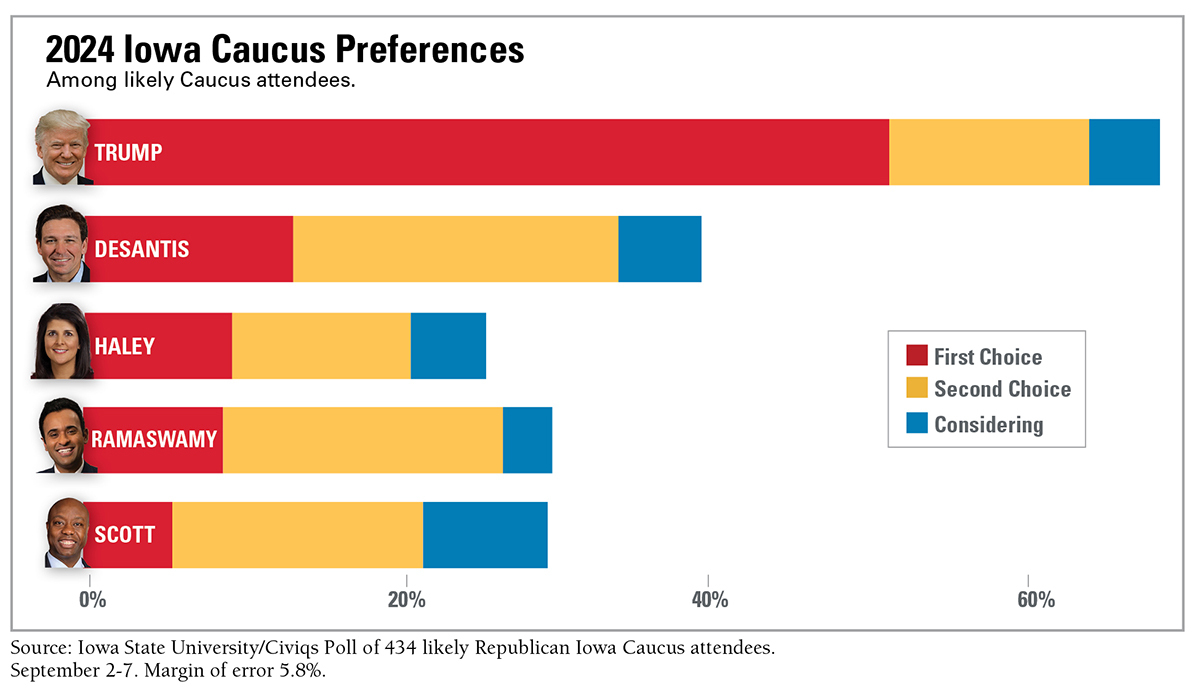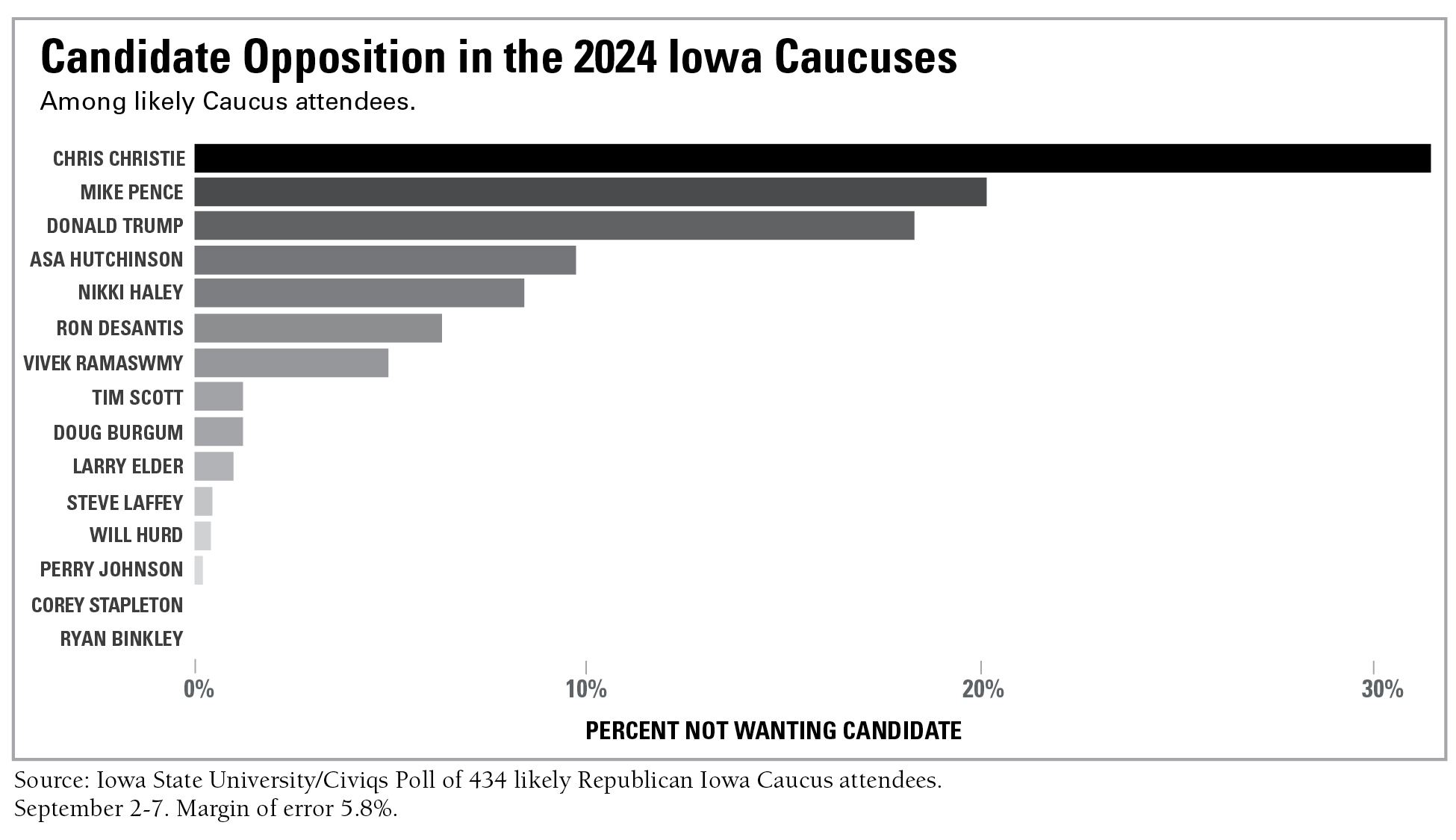
Graph created by Dave Peterson, Political Science, and Deb Berger, Strategic Relations and Communications, at Iowa State University. Larger image.
AMES, Iowa — Donald Trump far outpaces other Republican presidential nominees in an Iowa State University/Civiqs poll, which surveyed 1,128 registered voters from Sept. 2-7. The results are the first in a five-part, monthly poll intended to track shifting voter perspectives before the Iowa caucuses on Jan. 15, 2024.
Among the participants, 434 said they “definitely” or “probably” will attend the Iowa Republican Caucuses and identified themselves as Republican or independent. Just over half (51%) of these likely Republican caucus-goers picked former President Trump as their top choice. Florida Governor Ron DeSantis trailed in second place with 14%, followed by former U.N. Ambassador and South Carolina Governor Nikki Haley (10%) and entrepreneur and political commentator Vivek Ramaswamy (9%).
The participants’ second choice for candidates revealed a tighter line-up. DeSantis took the lead with 21% and Ramaswamy came in at 18%, followed by U.S. Senator Tim Scott from South Carolina with 16%. Trump is in fourth place for the second-choice candidate with 13% and Haley in fifth place with 11%.
Participants were also asked if there were candidates that they did not support. Three candidates stood out. Almost a third of respondents said that they did not want former New Jersey Governor Chris Christie to be the nominee. Former Vice President Mike Pence followed, with 20% saying they opposed him for the nomination. The only other candidate with more than 10% opposition was Trump, with 18% of the respondents saying they did not want him.

Graphic representing opposition to Republican presidential candidates among likely caucus-goers in Jan. 2024. Created by Dave Peterson, Political Science, and Deb Berger, Strategic Relations and Communications at Iowa State University. Larger image.
Dave Peterson, the Lucken Professor of Political Science, organized the poll and analyzed results with assistance from four undergraduate students. Peterson said the survey design is unique because some of the participants are interviewed for multiple polls. This provides information about who changes their minds and how support shifts between candidates.
“The race right now is clearly President Trump, a small second tier of four candidates — DeSantis, Haley, Ramaswamy, and Scott — and then a lot of candidates without much support at all. Trump’s lead is strong, but it also might be something of a ceiling because most Iowans have strong opinions about him,” said Peterson.
Of the candidates who form the second tier, Peterson said Scott may be a little behind the other three, but many Iowans have not ruled him out.
“Christie and Pence are in terrible shape,” said Peterson. “Christie isn’t a surprise since his campaign was always intended to make a lot of Republicans unhappy. Pence, however, is a bit surprising. He only has around 5% of the respondents who are even considering his candidacy but is actively opposed by over 20% of likely caucus goers."
The online survey was sent to selected members of the Civiqs research panel. An oversample of Republicans and independents were selected to produce a larger number of likely caucus attendees.
The survey results are weighted by age, race, gender, education, party identification, and congressional district to be representative of the population of registered voters and likely Republican Caucus attendees in Iowa. The survey has a margin of error of ±4.1% for registered voters and ±5.8% for likely Republican Caucus attendees, both at the 95% confidence level, accounting for the design effect.
Results of the next poll are expected in mid-October.
The Iowa State University/Civiqs poll is funded by Iowa State’s Department of Political Science, the Lucken Professorship in Political Science, and the College of Liberal Arts and Sciences.
Contacts
Dave Peterson, Political Science, daveamp@iastate.edu, 515-294-9306
Rachel Cramer, News Service, rcramer@iastate.edu, 515-294-6136
Quick look
Donald Trump far outpaces other Republican presidential nominees in an Iowa State University/Civiqs poll, the first in a five-part, monthly poll leading up to the 2024 Iowa Republican Caucuses. The poll also looks at second choice candidates and asks likely Republican caucus-goers who they do not support.
Quote
“The race right now is clearly President Trump, a small second tier of four candidates — DeSantis, Haley, Ramaswamy, and Scott — and then a lot of candidates without much support at all.”
Dave Peterson, Political Science
More news
Find more Iowa State University news and research stories at news.iastate.edu.